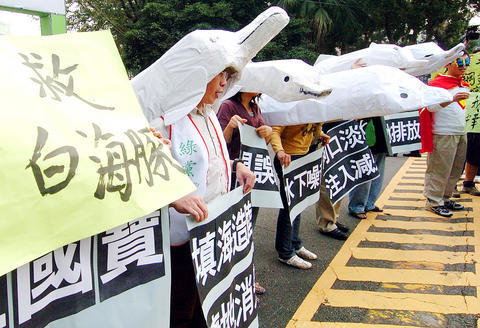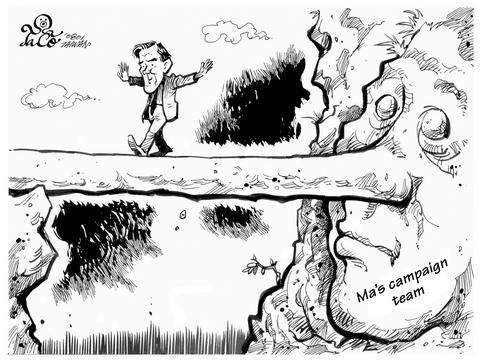 |
| DOLPHINS ON
THEIR MINDS Representatives from various environmental organizations that belong to the Taiwan Sousa Working Group protest in front of the Executive Yuan in Taipei yesterday. The group called on the government to draw up legislation to save the Indo-Pacific humpback dolphin. Also See: Groups make bid to save 'Matsu fish' Also See: CPC, Formosa ordered to study impact on dolphins
|
US county seeking local maths, Chinese teachers
OVERSEAS
OPPORTUNITY: The state of Nevada is the fifth US state to recruit secondary
education math and Chinese-language teachers from Taiwan, the MOE said
By Jenny
W. Hsu
STAFF REPORTER
Thursday, Jan 10, 2008, Page 2
Clark County School District in Nevada is seeking 14 mathematics and four
Mandarin Chinese language high school teachers from Taiwan for the school year
beginning in August, the Ministry of Education (MOE) said yesterday.
Interested teachers must submit their applications by Feb. 1.
Annual remuneration is from US$30,000 to US$64,000, depending on an applicant's
experience, educational level and qualifications, the ministry said.
Nevada is the fifth US state, after Indiana, Pennsylvania, Michigan and Ohio, to
recruit secondary education mathematics and Mandarin Chinese teachers from
Taiwan, the MOE's Bureau of International Cultural and Education Relations said.
Clark County will also provide assistance to help Taiwanese teachers with the
licensing process in the US.
The American-Chinese Foundation in the Las Vegas community will also offer
counseling and advice on housing, transportation, daycare, insurance and visa
applications and renewals.
The health and life insurance program for Clark County School District employees
is provided through the Teacher Health Trust.
The teachers are responsible for covering any additional costs for dependents.
Health coverage will start on Sept. 1.
The National Science Council said it will provide economy class round-trip
airfare for the accepted applicants.
The Clark County School District human resource recruitment division said the
district does not sponsor foreign students.
All applicants must obtain sponsorship for the J1 visa, which is valid for a
period of three years.
However, new teachers hired for the 2008 to 2009 school year will receive a
US$2,000 "new teacher bonus."
Applicants must possess a bachelor's degree and teaching experience in either
mathematics or Chinese language.
Applicants who have been certified by the MOE to teach Chinese language to
foreigners will be given priority in the application process.
People who did not graduate from a US college or university must have their
credentials verified and approved by the ministry.
Applicants must also provide a satisfactory TOEFL score to be considered, as
well as a resume -- in both English and Chinese -- a copy of the applicant's
highest educational degree obtained, a copy of his or her teacher certificate,
official transcripts and proof of his or her English ability.
All documents must be submitted before the beginning of next month. Qualified
applicants will be notified in the middle of March and will be summoned for an
interview in Taiwan with Clark County officials.
The Bureau of International Cultural and Education Relations said the MOE was
also negotiating with other US states, including Arizona and California, on
exporting qualified mathematics and Mandarin Chinese teachers from Taiwan.
Since 2005, Taiwan has sent 129 Mandarin Chinese teachers to countries including
the US, Thailand and the UK.
More details are available at www.edu.tw/EDU_WEB/Web/BICER/index.php,
www.ccsd.net/jobs, or by calling the bureau at (02)7736-5619.
 |
| DRIFTIN'
BLUES Adelie penguins drift on an ice floe in the Southern Ocean off the Australian Antarctic Territory on Friday. The new glacial ice Wilkins Runway, situated 65km from the Australian research station of Casey, will allow Australian scientists to greatly expand their studies on the effects climate change is having on Antarctica's fragile environment by providing 20 to 30 flights from Hobart each summer.
|

Voting in
the free world
Thursday, Jan 10, 2008, Page 8
For every person brought up in a free world, a referendum is an instrument of
democracy and joining a referendum is fulfilling one's civil duty. Before
joining the EU, Poles were asked in a referendum whether they wanted to be
members of the European community or not (75 percent said "yes"). Now, ahead of
the ratification of the Treaty of Lisbon (amending the Treaty on European Union
and the Treaty establishing the European Community), many Poles hope they will
be given a chance to decide whether to support or reject the treaty through the
referendum.
The principle of sovereignty requires that the consent of the people be given on
certain questions of public or national concern.
Hearing that the Chinese Nationalist Party (KMT) is urging people to boycott the
referendum, one can't avoid asking the questions: Is this a party that believes
in democracy? Can it safeguard the sovereignty of the country while attempting
to take the right to decide on matters of national concern out of the hands of
the people?
After all, there is already a Chinese state where people can't express their
consent or disapproval. Would the KMT prefer to follow the form of rule imposed
on the Chinese people by the Chinese Communist Party?
Hanna Shen
Poland
Taiwan
needs a green legislature
By Jerome Keating
Thursday, Jan 10, 2008, Page 8
WHEN TAIWAN WAS a one-party state dictatorship under the Chinese Nationalist
Party (KMT), the power of the country was in its president.
The Legislative Yuan was a rubber stamp body in which each legislator who had
been elected back in 1947 was guaranteed his position for life. The only thing
legislators had to do was approve what dictator Chiang Kai-shek (蔣介石) and later
what his son, former president Chiang Ching-kuo (蔣經國), directed.
This all began to change under former president Lee Teng-hui (李登輝) when the
"iron rice bowl" legislators who had not yet died had to step down. After 1992
legislators had to run for office and compete with members of other newly
allowed parties.
In 1996, another major change happened in Taiwan. The president, like members of
the Legislative Yuan, had to be elected by the public. At this point the balance
of power in Taiwan began to shift from the presidency to the Legislative Yuan.
This is the way it is today. The legislature creates laws, controls budgets and
confirms emergency orders. It can tell the Executive Yuan to change its
policies, it can amend the Constitution and it can settle disputes in matters of
self-governance of special municipalities, counties, cities and other
administrative units. It can also paralyze the country.
The KMT and its pan-blue alliance have always controlled the Legislative Yuan --
from the rubber stamp days of the Chiangs through today. They use it to promote
their own agenda and not that of the public. Whatever smoke and mirrors the
pan-blue media fabricates to make it seem like today's problems are the result
of the presidency, the reality is that the majority of the problems lay at the
door of the pan-blue legislature.
One serious problem is the injustice of not having a level playing field for all
political parties in Taiwan. The residue of the past one-party state rule is
that the KMT still owns the majority of the state assets left over from the
Japanese colonial era.
By its own declaration, the KMT admits to resources in excess of US$750 million.
This declaration does not include those state assets that have already been
siphoned off to the KMT leadership.
All other parties in Taiwan, blue or green, do not have a combined total of US$1
million in assets.
The KMT uses the assets for its own self-aggrandizement and ends: It can
out-advertise, out-spend and out-promote any and all of the other parties. This
injustice can never be righted as long as the KMT controls the majority in the
Legislative Yuan.
The KMT has repeatedly blocked the people of Taiwan from regaining what belongs
to them. In the upcoming elections, the KMT is telling its members to boycott a
referendum on its ill-gotten assets. The pan-blue dominated legislature must go
before Taiwan can be truly democratic.
In addition to a need for justice, the KMT-led pan-blue Legislative Yuan has
sabotaged the country, forcing it into paralysis as it strives to regain its
lost privilege.
The KMT would rather see Taiwan flounder than lose its legislative privilege and
thus its assets and benefits. Even the crass, bottom-line motivation behind the
KMT's goal of unification is more because of personal profit than a warped
ideology. If the KMT is voted out in Taiwan, ultimately its leaders would gamble
they could ingratiate themselves with the controlling cabal of China.
Their hope would be that by offering Taiwan as a sacrificial lamb they would be
feted as heroes and allowed to maintain their privilege as governors of the
island. Better to be a Puyi governor appointed by China than to continually risk
being a loser in a free election in a democratic state. Note the sniveling way
that Lien Chan (連戰) and James Soong (宋楚瑜) -- two-time losers and once long-time
enemies of the PRC -- went back to China to be feted after they lost in the last
presidential election.
Need other examples of the KMT's sabotage? Examine how the do-nothing
legislature blocked the country's arms budget for three years and only finally
passed it just before last year's session ended.
Rather than see anything positive happen under President Chen Shui-bian (陳水扁),
they prefer to weaken the country, blocking budgets and appointments to the
Control Yuan. In this way, the anti-corruption watchdog of the country would be
ineffectual.
Look at the legislative elections. The KMT caused an uproar to protest the
Central Election Committee (CEC) ruling for a one-step voting procedure. Many
suspect the KMT wanted a two-step procedure so that they could measure how
effective bribes were concerning the referendum ballots.
If the KMT paid a voter to oppose the referendum for recovering state assets,
the best way to know if the person followed through would be to see if he or she
picked up the ballot. If people accept a ballot after getting a bribe, the KMT
could wonder why they did so. With a ballot in hand, a person could still
secretly vote in favor of the referendum.
Facing a confrontation with the CEC and legal action, the KMT finally accepted a
compromise, but almost immediately afterwards, the KMT did an about-face and
told its constituents to boycott the referendums.
This exposed the KMT's true intent. Their original referendum on rooting out
corruption was a smokescreen to match the green referendum on state assets and
the KMT abandoned it without compunction.
The ruckus they raised over the voting procedure was a farce. What they were
really after was to stop the state assets referendum.
I do not mean to say that green legislators and officials are free of
corruption. Many dogs have learned from the wolves and are driven by the same
greed and a system of favors that masks corruption. They too must be weeded out.
But first the playing field must be leveled; the state assets must be properly
in the hands of the state and not one political party. Taiwan must get rid of
politicians who serve their party to the detriment of the nation.
Level the playing field and progress will follow.
Jerome Keating is a Taiwan-based writer.